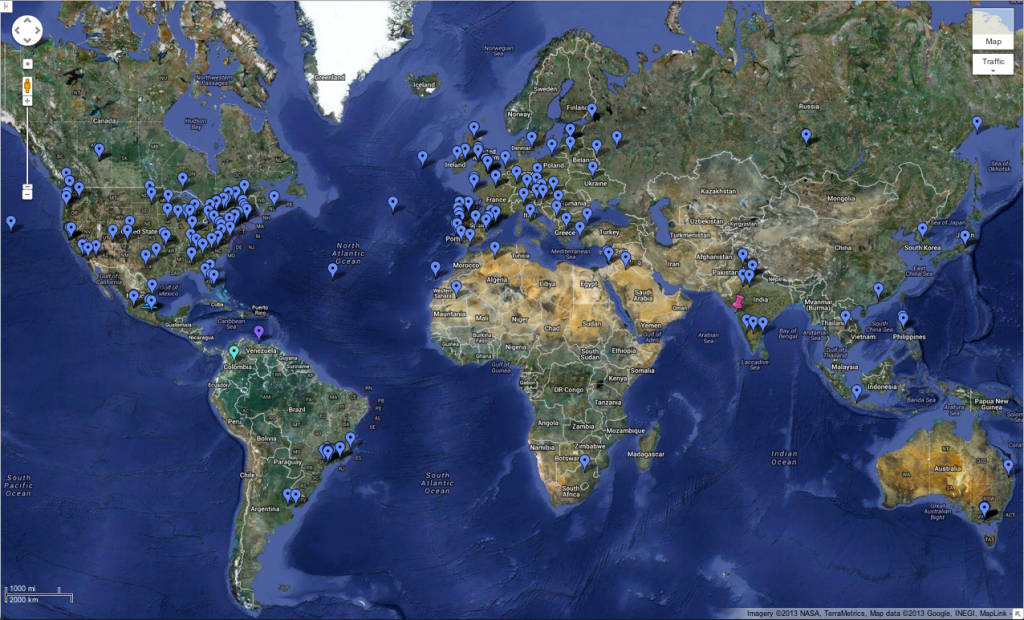Jul 12, 2013
Duke Sports and Society MOOC Wraps Up

admin
Professor Orin Starn‘s Sports and Society MOOC, which examined a number of cultural, political, and social issues that surround sports, wrapped up on June 21. The list of weekly topics offers an overview of the wide-ranging course:
Week 1: Introduction to Play and Sports
Week 2: Globalization, […]
Professor Orin Starn‘s Sports and Society MOOC, which examined a number of cultural, political, and social issues that surround sports, wrapped up on June 21. The list of weekly topics offers an overview of the wide-ranging course:
Week 1: Introduction to Play and Sports
Week 2: Globalization, Nationalism and the Politics of Sports
Week 3: Race, Sports, and Identity in a Multicultural World
Week 4: Women’s Sports, Heteronormativity, and the Long Life of Homophobia
Week 5: Why Are We Sports Fans?
Week 6: The (Mega)Business of Sports
Week 7: Extreme and Outdoor Sports
What was it like?
Each week, students watched 3-5 short, topical video lectures offered by Professor Starn, and read a related article or book excerpt. Each week also featured a “Sport of the Week” video, in which Starn or a guest lecturer provided historical, cultural, and contextual information about that week’s choice. Featured sports included golf, capoeira, and skateboarding.

ESPN Baseball Analyst Doug Glanville listens to a Sports and Society student’s comments during a Google Hangout.
The course also offered students the opportunity to interact directly with Professor Starn and notable guests via several Google Hangouts. Guest panelists included (click links to see archived videos of the Hangouts): ESPN Baseball Analyst Doug Glanville, renowned sports journalist Selena Roberts, and leading sports authority David Andrews.
Additionally, Starn provided students with the title of (and, whenever possible, a link to watch) an optional “Sports Movie of the Week.” Students could then discuss the film with each other, Starn, and the course Teaching Assistants in a dedicated discussion forum.
In order to earn a Statement of Accomplishment, students were required to score 70% or higher on 6 of the 7 weekly homework assignments and on 6 of the 7 weekly quizzes.
Who took it?
Students enrolled: 19,281
Student “participating” (viewed at least one lecture video): 6,918
Statements of Accomplishment awarded: 1,626 (8.4% of enrollees, 23.5% of participants)
Students that posted in the forums: 1,080
Streaming video views: 101,629
Videos downloaded: 47,531
Class Map (students were optionally allowed to place a “pin” on this map to indicate their location):

How did it go?
Students’ Thoughts
As the class wound down, students posted comments in the discussion forums.
Thank you, Professor Starn and your team, for a most enjoyable and informative learning experience. I initially thought it would be a fun course, but a lightweight and shallow one. In fact, it proved to be substantive and thought provoking. I didn’t know what a cultural anthropologist studied in his field. This was a real eye-opener for me.
Thank you, Dr. Starn, for an enjoyable experience that I am sorry to see come to an end. Sports and Society has both helped me look at sports (which I love to watch!) with new eyes and it has greatly deepened my understanding of how it influences and is influenced by society. The reading and movie suggestions were for the most part not anything I would ever have picked up on my own. And that is why taking classes like this are so enjoyably enlightening. With much appreciation…
I just wanted to let you and your staff know that I truly enjoyed your lectures and course. It was one of the most entertaining classes I’ve ever taken. Being an Olympian, it was incredible to have that perspective having been on all levels of sport (amateur, collegian, professional, Olympian, fan, and spectator). You may have encouraged me to further my development to seek a graduate degree that’s sports related. I now have a collection of books I’m interested in reading, thanks to you.
Instructor’s Thoughts
Dr. Starn offered the following reflection on teaching a MOOC for the first time:
Putting together an on-line course was more work than I had ever imagined. As a crude estimate, I’d say it took fifteen times more time than a regular class. It’s like making, in my case, 30 short movies, with a very small production team (actually, in this case just me and a heroic recent Duke graduate!). Goodbye, weekends!
What I loved about the course was what I think everybody does – the chance to reach such a diverse, global bunch of students. I was very moved by the e-mails and other messages of thanks from Kenya, Bangladesh, Brazil, and a lot of other places at the end of the class.
On-line education is never going to substitute for the human contact of a small face-to-face class. But it’s still an exercise, however imperfect, in the democratization of education, giving access to good courses to many people who for various reasons can’t do a regular college class (including the housebound elderly and people with physical disabilities who also can’t leave home).
I’m not sure I learned all that much that will be useful in my Duke teaching. I found that teaching on-line is a whole different animal than the regular classroom. It demands learning an entirely different skill set, including what for me was the brutal challenge of trying to lecture to the camera.
I am very glad that I did it.
Future
Dr. Starn may teach this course again, or another online course, in the future. You can watch for additional sessions of Sports and Society by adding the course to your Coursera Watchlist from the course landing page. He will also post any future online course offerings on his own website, www.orinstarn.com.